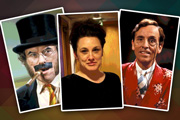
The Frequency Of Laughter: A History Of Radio Comedy
- Radio documentary
- BBC Radio 4
- 2014
- 6 episodes (1 series)
A six-part history of radio comedy, covering 1975-2005, presented by journalist and radio fan Grace Dent. Features Grace Dent.
Press clippings
The Frequency Of Laughter was a simple but effective idea: the history of British radio comedy from the late 70s to the present-day, presented in the form of interviews with pairs of participants, ranging from Graeme Garden through Angus Deayton to Meera Syal, all talking to Grace Dent, who asked the right questions.
David Hepworth, The Guardian, 20th December 2014I have been enjoying Grace Dent's Saturday morning series on the history of radio comedy, The Frequency of Laughter. She's worked her way from 1975 to 2005, just by talking to two people who were involved in each five-year era. Her questions are insightful, and she creates a relaxed, slightly naughty atmosphere that brings out the best in her interviewees. A couple of them have been quite indiscreet, and what's made those indiscretions more enjoyable is that the producers have tracked down whoever they've been rude about and asked them what they remember. So, in the show that covered 1995-2000, radio producer Paul Schlesinger recalled Sean Lock and Bill Bailey being forced to read out episodes from 15 Storeys High to a reluctant commissioner, who said "I don't understand why this is funny", but grudgingly gave them a few episodes. And then we heard from that very commissioner, who insisted that this was "one of the most joyful moments" he'd ever had in his career, when Bill Bailey read for him. No mention of Lock, whose show it was. Hmm.
In the previous programme, covering 1990-95, Sarah Smith, another Radio 4 producer, admitted that she used to favour certain writers for the satirical sketch show Week Ending: new talent such as Richard Herring and Stewart Lee. Other producers didn't, and lo, we heard from one, Diane Messias. She explained clearly that she believed that topical satire should make a political point and that Lee and Herring didn't do this, creating their jokes by laughing at a situation. "Both methods are valid," she said firmly. "Except I'm right."
Miranda Sawyer, The Guardian, 7th December 2014